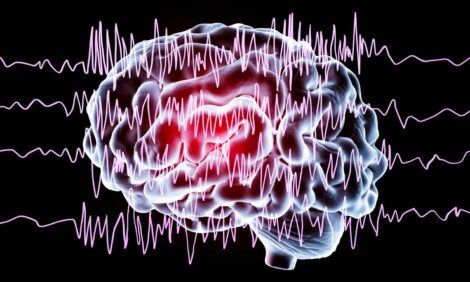Disrupted Sleep Is More Dangerous Than Not Getting Enough


Written and verified by the psychologist Valeria Sabater
Disrupted sleep can be more harmful than not getting enough sleep. That might sound hard to believe, but have you ever had a night where you kept waking up? How did you feel the next day? Probably exhausted, in a bad mood, apathetic, and unmotivated.
Sleep disorders are more common and more serious than you probably think. Nighttime wakings are like little rips in the fabric of your normal sleep cycle. As you probably know, these sleep phases follow very concrete patterns and times. Interrupting them disrupts the brain’s balance and other metabolic processes that your body does at night.
To sleep well is to live well. Consequently, it’s important to do what you can to make sure you get enough rest. After all, sleep is a biological necessity your physical health and psychological well-being depend on.

What are the effects of disrupted sleep?
There are several negative side effects of disrupted sleep. Most new parents and shift-workers are well aware of them. When we talk about quality nighttime sleep, the number of hours you get is just as important as continuity (avoiding interruptions).
Frequent wakings are a type of insomnia, which is a type of sleep disorder. You might go to sleep at 11 p.m., for example, and fall asleep right away. If you wake up 20 times over the next eight hours, however, you aren’t getting healthy or restorative sleep. Unfortunately, this is a reality for thousands of people.
Let’s take a look at some of the consequences of this problem.
Less slow-wave sleep means a higher risk of depression
Disrupted sleep three days in a row is enough to make you feel less optimistic, according to a study conducted at Johns Hopkins University in Baltimore. Patrick Finan, a psychiatry professor and research director, explains the following:
- Disrupted sleep is worse for your mood than a lack of sleep.
- When your sleep is disrupted at night, it alters your sleep cycles.
- Disruptions make it impossible to move from the non-REM phase into the REM phase, which is crucial for your body and brain.
- These alterations reduce the number of slow waves the brain experiences.
- The reduction in slow-wave sleep correlates with a greater risk for disorders such as depression.
Sleeping in short intervals at night stresses the brain and makes it impossible to carry out all the essential processes of each phase of sleep. That has a serious impact on your mood.
Memory issues and long-term cognitive problems
The effects of disrupted sleep can be dangerous, especially if they occur for long periods of time. Studies like this one from the Sleep & Cognition group at the Netherlands Institute for Neuroscience reveal, for example, that one of the most common side effects of interrupted sleep is memory lapses.
- The structure of sleep and sleep cycles are essential for properly consolidating what you learn while you’re awake. That goes for everything you see, feel, experience, etc.
- During slow-wave sleep and, later, in the REM phase, your brain integrates the events in your declarative memory (long-term) and consolidates them correctly.
- Other side effects of disrupted sleep are concentration problems and indecisiveness. A lack of quality sleep slows your reaction times and makes it hard to respond to life’s problems.
There’s also another important aspect of experiencing sleep interruptions in the long term. This condition can actually cause cognitive deficiencies. Your brain becomes more fragile and less agile. It’ll make fewer neural connections and make you more likely to suffer from neurodegenerative disorders, such as Alzheimer’s.
Effects of disrupted sleep: migraines
Sleep disorders that last weeks or months tend to cause headaches. You’ve probably experienced this at some point in your life, most people have. It’s that classic foggy feeling in the morning that slowly turns into a migraine.
Research shows that, when the brain doesn’t reach the REM phase, one of the most common side effects is the onset of these bothersome conditions. Studies such as this one from the Department of Neurology at the University of California link the problem of disrupted sleep with the onset of migraines. The cause could be a genetic mutation. These fascinating clues to common problems will undoubtedly be further explored by scientists in the coming years.

Treatments for sleep disorders
Disrupted sleep could be caused by a triggering factor that’s important to identify. That’s why you should go to your doctor if you feel like you aren’t getting restful sleep. If you wake up more tired than when you went to sleep or if you’re experiencing memory lapses and headaches, make an appointment with a medical professional.
Restless legs syndrome and sleep apnea are often associated with nighttime wakings. Another common factor is stress. It’s easy for people to use over-the-counter sleeping pills instead of solving the root cause of the problem.
Incorporating healthy habits into your life and limiting your use of technology two hours before you go to sleep can help reduce nighttime wakings. Whatever your approach, address these sleep issues as soon as you can before they become a chronic problem.
Disrupted sleep can be more harmful than not getting enough sleep. That might sound hard to believe, but have you ever had a night where you kept waking up? How did you feel the next day? Probably exhausted, in a bad mood, apathetic, and unmotivated.
Sleep disorders are more common and more serious than you probably think. Nighttime wakings are like little rips in the fabric of your normal sleep cycle. As you probably know, these sleep phases follow very concrete patterns and times. Interrupting them disrupts the brain’s balance and other metabolic processes that your body does at night.
To sleep well is to live well. Consequently, it’s important to do what you can to make sure you get enough rest. After all, sleep is a biological necessity your physical health and psychological well-being depend on.

What are the effects of disrupted sleep?
There are several negative side effects of disrupted sleep. Most new parents and shift-workers are well aware of them. When we talk about quality nighttime sleep, the number of hours you get is just as important as continuity (avoiding interruptions).
Frequent wakings are a type of insomnia, which is a type of sleep disorder. You might go to sleep at 11 p.m., for example, and fall asleep right away. If you wake up 20 times over the next eight hours, however, you aren’t getting healthy or restorative sleep. Unfortunately, this is a reality for thousands of people.
Let’s take a look at some of the consequences of this problem.
Less slow-wave sleep means a higher risk of depression
Disrupted sleep three days in a row is enough to make you feel less optimistic, according to a study conducted at Johns Hopkins University in Baltimore. Patrick Finan, a psychiatry professor and research director, explains the following:
- Disrupted sleep is worse for your mood than a lack of sleep.
- When your sleep is disrupted at night, it alters your sleep cycles.
- Disruptions make it impossible to move from the non-REM phase into the REM phase, which is crucial for your body and brain.
- These alterations reduce the number of slow waves the brain experiences.
- The reduction in slow-wave sleep correlates with a greater risk for disorders such as depression.
Sleeping in short intervals at night stresses the brain and makes it impossible to carry out all the essential processes of each phase of sleep. That has a serious impact on your mood.
Memory issues and long-term cognitive problems
The effects of disrupted sleep can be dangerous, especially if they occur for long periods of time. Studies like this one from the Sleep & Cognition group at the Netherlands Institute for Neuroscience reveal, for example, that one of the most common side effects of interrupted sleep is memory lapses.
- The structure of sleep and sleep cycles are essential for properly consolidating what you learn while you’re awake. That goes for everything you see, feel, experience, etc.
- During slow-wave sleep and, later, in the REM phase, your brain integrates the events in your declarative memory (long-term) and consolidates them correctly.
- Other side effects of disrupted sleep are concentration problems and indecisiveness. A lack of quality sleep slows your reaction times and makes it hard to respond to life’s problems.
There’s also another important aspect of experiencing sleep interruptions in the long term. This condition can actually cause cognitive deficiencies. Your brain becomes more fragile and less agile. It’ll make fewer neural connections and make you more likely to suffer from neurodegenerative disorders, such as Alzheimer’s.
Effects of disrupted sleep: migraines
Sleep disorders that last weeks or months tend to cause headaches. You’ve probably experienced this at some point in your life, most people have. It’s that classic foggy feeling in the morning that slowly turns into a migraine.
Research shows that, when the brain doesn’t reach the REM phase, one of the most common side effects is the onset of these bothersome conditions. Studies such as this one from the Department of Neurology at the University of California link the problem of disrupted sleep with the onset of migraines. The cause could be a genetic mutation. These fascinating clues to common problems will undoubtedly be further explored by scientists in the coming years.

Treatments for sleep disorders
Disrupted sleep could be caused by a triggering factor that’s important to identify. That’s why you should go to your doctor if you feel like you aren’t getting restful sleep. If you wake up more tired than when you went to sleep or if you’re experiencing memory lapses and headaches, make an appointment with a medical professional.
Restless legs syndrome and sleep apnea are often associated with nighttime wakings. Another common factor is stress. It’s easy for people to use over-the-counter sleeping pills instead of solving the root cause of the problem.
Incorporating healthy habits into your life and limiting your use of technology two hours before you go to sleep can help reduce nighttime wakings. Whatever your approach, address these sleep issues as soon as you can before they become a chronic problem.
All cited sources were thoroughly reviewed by our team to ensure their quality, reliability, currency, and validity. The bibliography of this article was considered reliable and of academic or scientific accuracy.
- Libman, E., Fichten, C., Creti, L., Conrod, K., Tran, D. L., Grad, R., Jorgensen, M., Amsel, R., Rizzo, D., Baltzan, M., Pavilanis, A., & Bailes, S. (2016). Refreshing Sleep and Sleep Continuity Determine Perceived Sleep Quality. Sleep disorders, 2016, 7170610.https://doi.org/10.1155/2016/7170610
- K. C. Brennan, E. A. Bates, R. E. Shapiro, J. Zyuzin, W. C. Hallow s, Y. Huang, H.-Y. Lee, C. R. Jones, Y.-H. Fu, A. C. Charles,
L. J. Ptáček, Casein Kinase Iδ Mutations in Familial Migraine and Advanced Sleep Phase. Sci. Transl. Med. 5, 183ra56 (2013). - Kishi, A., Van Dongen, H. P., Natelson, B. H., Bender, A. M., Palombini, L. O., Bittencourt, L., Tufik, S., Ayappa, I., & Rapoport, D. M. (2017). Sleep continuity is positively correlated with sleep duration in laboratory nighttime sleep recordings. PloS one, 12(4), e0175504.https://doi.org/10.1371/journal.pone.0175504
- Van Someren, E. J., Cirelli, C., Dijk, D. J., Van Cauter, E., Schwartz, S., & Chee, M. W. (2015). Disrupted Sleep: From Molecules to Cognition. The Journal of neuroscience : the official journal of the Society for Neuroscience, 35(41), 13889–13895.https://doi.org/10.1523/JNEUROSCI.2592-15.2015
This text is provided for informational purposes only and does not replace consultation with a professional. If in doubt, consult your specialist.







